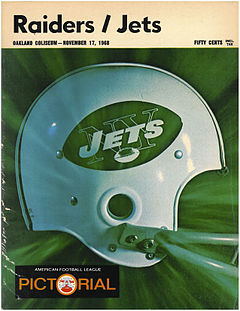
Back Heidi Game Spanish Heidi Game French Heidi Game Italian Heidi Game Portuguese Игра «Хайди» Russian
 Program cover from the Jets-Raiders game from November 17, 1968 | |||||||||||||||||||
| |||||||||||||||||||
| |||||||||||||||||||
| Date | November 17, 1968 | ||||||||||||||||||
|---|---|---|---|---|---|---|---|---|---|---|---|---|---|---|---|---|---|---|---|
| Stadium | Oakland–Alameda County Coliseum, Oakland, California | ||||||||||||||||||
| Favorite | Raiders by 7+1⁄2 points | ||||||||||||||||||
| Referee | Bob Finley | ||||||||||||||||||
| Attendance | 53,318 | ||||||||||||||||||
| TV in the United States | |||||||||||||||||||
| Network | NBC | ||||||||||||||||||
| Announcers | Curt Gowdy and Al DeRogatis | ||||||||||||||||||
The Heidi Game or Heidi Bowl was a 1968 American Football League (AFL) game between the Oakland Raiders and the visiting New York Jets. The contest, held on November 17, 1968, was notable for its exciting finish, in which Oakland scored two touchdowns in the final minute to win the game 43–32. However, NBC, the game's television broadcaster, decided to break away from its coverage on the East Coast to broadcast the television film Heidi, which caused many viewers to miss the Raiders' comeback.
In the late 1960s, few professional football games took longer than two and a half hours to play, and the three-hour time slot allotted to the Jets and Raiders was thought to be adequate. A high-scoring contest, together with a number of injuries and penalties for the two bitter AFL rivals, caused the game to run longer than usual. NBC executives had originally ordered that Heidi begin at 7 p.m. EST, but then decided to allow the game to air to its conclusion. However, communicating this revised plan to the technicians running NBC's master control proved impossible – as 7 p.m. approached, NBC's switchboards were jammed by viewers phoning to inquire about the night's schedule, preventing the planned change from being communicated. Heidi began as scheduled, preempting the final moments of the game and the two Oakland touchdowns in the eastern half of the country, to the outrage of viewers.
Response to the pre-emption by viewers and other critics was negative; the family members of several Jets players were unaware of the game's actual conclusion, while NBC received further criticism for its poor timing in displaying the final score of the game during the Heidi movie. NBC's president Julian Goodman formally apologized for the incident. The Jets and Raiders met again on December 29 in New York in the AFL Championship Game, with the Jets winning 27–23. Two weeks later, they defeated the Baltimore Colts of the National Football League (NFL) in Super Bowl III.
In the aftermath of the incident, NBC installed special "Heidi phones", with a connection to a different telephone exchange from other network phones, to ensure that network personnel could communicate under similar circumstances. The game also had an influence on sports broadcasting practices; the future National Football League would contractually stipulate that all game telecasts be shown to their conclusion in the markets of the visiting team, while other major leagues and events adopted similar mandates. In 1997, the Heidi Game was voted the most memorable regular season game in professional football history.